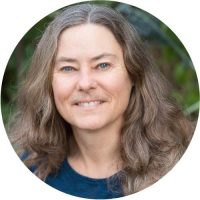THE MICROBIOME SUMMIT : The New Path to Health
Gardening to Cultivate your Microbiome
Anne Biklé, MLA

Anne Biklé, MLA
When landscape architect Anne Biklé set out to improve the state of the soil in her garden, she ended up making connections between soil and the gut.
With her husband, Dr. David Montgomery (a fellow Town Hall Medicine speaker), Biklé wrote an insightful book called “The Hidden Half of Nature,” that draws on these connections between the soil in our gardens and our guts. In this interview, you will learn about how to feed microbes – both in the soil and the gut. Biklé also prompts us to think about our own microbes, how they communicate with our immune system, and our own cancer risk.
- Tracey:
- Welcome, Anne. Thank you for joining me here today. I was absolutely fascinated by the book that you wrote with your husband and there were so many parallels that you drew between your gardening experience and the human body. Would you mind sort of taking us through how you came to your conclusions?
- Anne:
- Tracy, thanks for that question. I think that anybody who’s done any kind of gardening, you quickly catch on that it’s about taking care of something. And in some ways maybe I came to this a little backwards because when we set about to build a garden our soil was in such lousy shape that I was actually more concerned about the soil than I was the plants. And so, over the first several seasons of having the garden we’re feeding it all of this organic matter. I’d been making up mulch mixes from things like oak leaves and coffee grounds and chips from arborists and I was just – you might even say I went a little OC on that but our soil was just so bad that I just thought we’ve put all of this time and money into this garden and if the soil isn’t going to work we are just going to be sunk. So, I began to see though that after a few seasons of doing that the plants and the whole garden really started to come together. And I think anybody can look at a plant and you can see, hmm, that plant’s ailing, or you can see, wow, I want to have what that plant’s having. It’s sort of like that question. Hmm, I’d like to know what’s in their water. Well, what was happening in the garden is that the microbial life in the soil, once we began to feed it organic matter it really kicked into gear. It was breaking down all that organic matter and, like Dave described, it was turning the organic matter into other things. Lots of compounds and molecules that were just absolutely vital to the health of all of the plants in the garden. And so, when it came to seeing just what a change in soil had done for our plants, it was an easy leap for me as a biologist to see, hmm, inputs into our body … that’s a lot like inputs into the soil and I’m sure that there are connections here.
- Tracey:
- So Anne, you had a very personal experience that drew you to some of these conclusions that there are connections between what was happening in your garden and happening in your own body.
- Anne:
- Yes, I did. It was a health challenge that I hope to never have to face again. I’m incredibly thankful that it’s behind me now. But I found out that I had cancer after a routine exam at my doctor and it came completely out of left field. As I said, that’s now behind me and I’m happy about it. But at the time I really dove into what’s the basis of my health, where does it come from and what do I do when it’s threatened? And when I began to think about this I was working with both traditional doctors and a naturopath and it became pretty clear from both of those sources that my immune system was a big, big part of my health. I had never really thought about immunity though in terms of cancer. I’d always thought about it, like probably most of us, in terms of, well, if some cold bug gets in us it’s the job of the immune system to go after it. Well, that’s not its only job. It’s also any time you have any sort of abnormal cell growth, which is what cancer is, it’s the immune system’s job to go after those cells, eat them up and get them out of there. And so that led to me wondering what went haywire with my immune system. Now I was very motivated and interested to do anything I could to support my immune system and that’s what led me into, sort of, the world of the microbiome. The time Dave and I were about halfway through writing The Hidden Half of Nature and some facts begin to line up. First of all, most of our microbiome lives in, of all places, the very lower end of our digestive tract, in our colon. The other fact that lined up with that is that most of our immune system is wrapped around our digestive tract and, again, most of it is around the colon. And so there’s this constant cross-talk, back and forth, between what’s going on in our colon and the immune system that is right outside the wall of our colon. And what microbiome scientists have been learning over the past several years is that this crosstalk, all of this chemical signalling that is going on between our immune cells and our microbiome is absolutely vital to our health. And when I began to look into that it then led me to questions of diet – what was I eating? Because it turns out our bodies are really quite a bit like an ecosystem and we are at least as much microbial as we are human. And an ecosystem is really simply just a community of life forms that are dependent on one another. And I saw, I am really dependent on my microbiome and my immune system is dependent on my microbiome. I would like to do what I can to keep that part of me up and running on its own feet, doing everything that it’s supposed to be doing. And that led me, of course, into diet and examining what my diet was like, the types of things that I was cooking for Dave and I. If you want, I can go into those diet things right now.
- Tracey:
- Yeah. So, the whole premise that we really are eating for our microbes … if our microbes are the ones that are composting down like they did in your garden our food in our gut and then sending out the metabolites and communicating to the immune system, it seems like diet should be the number one thing that we’re thinking about and what kind of food we want to send down there for the microbes to eat. So, what conclusions did you come to about diet and what the microbes would most benefit from?
- Anne:
- Yeah, I’m just sitting here listening to you say that. I’m just, you know, shivers going down my spine because I think this is fascinating, this is important, and it’s just really cool. I mean, as a biologist and a gardener, all of this stuff really came together to me when I began to think about the tight, tight integration that our bodies have with the microbial world within us, the microbial world outside of us. And, again, I was envisioning what many of the things I have been doing in the garden, which was layering all of this organic matter out on top of the beds. There’s no need to dig it in and be disrupting all of that soil life. You just lay it on top of the beds. And likewise, I would envision in my mind eating a diet that was abundant with plant foods. We don’t, neither Dave nor I advocate this diet or that diet. It’s sort of like this. First of all, eat to feed your microbiome and that means just a really, really goodly amount of plant foods. After that you can eat what you want. But what we actually ended up discovering is that once our microbiome was fed – that’s how I began to think about it – I didn’t really need or want a whole lot of other things to eat. And I want to go back to that imagery of laying organic matter on top of the garden beds because that’s how I envision plant foods coming into my body, travelling through my digestive tract. And we have a great figure in the book for that. And it all lands down in the colon and I kind of think about our colon as, well a number of things. One is, it’s like tranquil pastures for those microbial herds because they are grazing on all of those whole plant foods that make it down to the colon. I’m going to draw a parallel now. Dave talked about what goes on in the soil around the roots of a plant and there’s a very special zone. It’s called the rhizosphere. Rhizo just means root. Sphere, of course, is your world of. And right next to roots, right on the root surface and even inside of the root is probably the most biodiverse and densest collection of life that there is on this planet, around roots of the plant. Our gut, and in particular our colon, is very much like the rhizosphere. We have a lining on our colon and this is where most of our microbiome is hunkered down. It’s living in this environment right in the lining of our colon and it’s tranquil pastures. So, the plant foods come down and our microbiome gets to work on decomposing those and breaking them down. And what’s really interesting is this other parallel. Just as in the rhizosphere these microbes are producing by-products from all of that organic matter. In our colon, microbes are producing by-products from all of these plant foods. And we really need a whole other way of thinking of these by-products because technically they’re the waste products of these microbes. They’re also called metabolites. Some of these metabolites have drug-like qualities, medicinal qualities. All of a sudden you begin to think about your colon. It is not some kind of awkward garbage can at all. What it really is, is it’s like an onboard medicine chest. We have the ability to stock it. I mean, think about that.
- Tracey:
- I know. Incredible.
- Anne:
- So, how do we stock it? A goodly amount of plant foods in our diet. So, that, as I began to see, you know, these parallels between what’s going on in the soil and what’s going on in our gut and the practices that can cultivate the microbiome, both in the soil and our gut so that they’re producing these metabolites that benefit us. I mean, one fact that I continue to think about and talk about – we don’t entirely know what all of it means yet because we’re still learning a lot about the microbiome but somewhere around 40 percent of the compounds that are circulating in our blood are not made by the cells in our body. They’re made by our microbiome..
- Tracey:
- The parallels that you draw back to your biology training and thinking about what’s happening in your garden and translating that to the gut is absolutely fascinating. I think there is a lot that biologists and doctors need to sit down and talk about.
- Anne:
- Right. Long ago, long before we had pharmaceutical companies, agri-chemical companies, really all we had was our microbiome and our diet. Of course hundreds of years ago we knew nothing about our microbiome, nothing about our onboard medicine chest. But I think about it this way. The fact that we’re all still here and there’s quite a few of us on the planet now, there was something to feeding our microbiome because it’s stood the test of time, right? We are still here and that, to me, tells me alone just how important it is that we have this part of our bodies that is made to interact with our microbiome. I mean, it’s a very intimate, very tight connection. And so we want to be taking care of this microbiome. It’s really, really important and I think we talked before about microbial life and some people think, oh, it’s kind of creepy. Other people think, really, is it there? It’s invisible. How important can this be? And I just have to say, you know, the tiniest creatures on Earth do some of the biggest work in our lives and on our planet. And if you’re having a hard time visualizing all of that so be it. But if you can somehow think of this workforce, this part of you that is working on your behalf and that like anything it needs maintenance, it needs care taking and it needs protection, that’s sort of how I think about the microbiome in me. And when I’m out in the garden I pretty much have the same thoughts.
- Tracey:
- Absolutely fascinating. If you were to sort of try to give a visual for our listeners of the connection between the garden and their guts. What would be something that they could really have in their minds?
- Anne:
- So, Dave and I often will end our book talk with something that is actually only six words and the audience usually – you know, they’re hanging there like, oh, what? Tell us. Because we’ve told people a lot of dense information. Some people may never have thought about their gut. A lot of people aren’t gardeners. It’s something to get somebody who’s both very into their gut and very into their garden. They may well have come up with this. And what it really comes down to is organic matter and we know that we talk about organic matter on the garden and really our diet is like organic matter in our gut. What we learned from the garden is really pretty simple and it goes like this: If you just mulch your soil inside and out, everything will be okay. That’s sort of the six words that we’ve boiled things down to and it’s not super-complicated. It’s something that everybody can do. I’m telling you, there is so much free organic matter out there in the world for people’s gardens. You just sort of have to recognize it and be willing to go and collect it and bring it home. And likewise, there is an amazing amount of plant foods that are available for all of us to integrate into our diets. Those are some of the changes that we made. So, that’s why we continue to say mulch your soil inside and out.
- Tracey:
- I love that. Thank you so much, Anne.
- Anne:
- Yeah, you bet.



